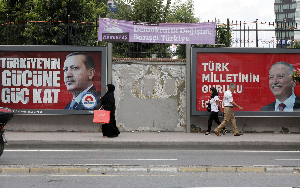Turkey Bets, yet again, on Barzani: Turkey-KRG Relations in Light of the Regional Turbulence
By Gallia Lindenstrauss
February 4th, 2016, The Turkey Analyst
In view of the challenges Turkey is facing in the Middle East, Ankara is attempting to further solidify its relations with the Kurdish Regional Government (KRG) and specifically with KRG’s president, Massoud Barzani. While this policy may assist Turkey in increasing its influence over the future of Iraq and assist it in diversifying its energy suppliers, it is less likely to help Turkey in its internal struggle with its Kurdish minority, or in countering the Kurdish aspirations in Syria. Yet, as the only still relevant remnant of Turkey’s ‘zero Problems’ policy, Turkey-KRG relations do have the potential to assist Ankara in maintaining and solidifying its influence over the future of Iraq.
Turkey Moves Toward a Grand Bargain with Kurdistan
By Micha’el Tanchum (vol. 7, no. 19 of the Turkey Analyst)
On October 20, Turkey’s foreign minister Mevlut Çavuşoğlu announced that “Peshmerga” fighters from the Iraqi Kurdish Regional Government (KRG) are going to be allowed to transit Turkish territory to reinforce the beleaguered Kurdish forces of the Democratic Union Party (PYD) defending the Syrian Kurdish town of Kobane against the Islamic State of Iraq and al-Sham (ISIS.) The Turkish government had previously turned down requests for it to open a land corridor. Turkey’s policy u-turn means that it now has a unique opportunity to rehabilitate its failed Kurdish policy and arrive at a grand bargain to secure its national interests along its borders with Syria and Iraq. To create a more amenable constellation of Kurdish political allies, the Turkish government will need to offer a meaningful accommodation of Kurdish demands within Turkey.

Erdoğan Wins Presidency With an Unsustainable Majority
By Micha’el Tanchum (vol. 7, no. 14 of the Turkey Analyst)
President-elect Recep Tayyip Erdoğan secured his margin of victory with a last minute appeal to Turkish nationalist voters, having failed to expand his support among Kurds despite significant overtures on Kurdish issues. President-elect Erdoğan faces an ineluctable choice between expanding his “Kurdish Opening,” moving Turkey closer to becoming a binational state, and assuaging right-wing Turkish nationalism. Neither choice bodes well for a Justice and Development Party (AKP) majority in Turkey’s 2015 parliamentary elections. The AKP will be hard put to manage rising expectations among Turkey's Kurds while retaining Turkish nationalist support.






